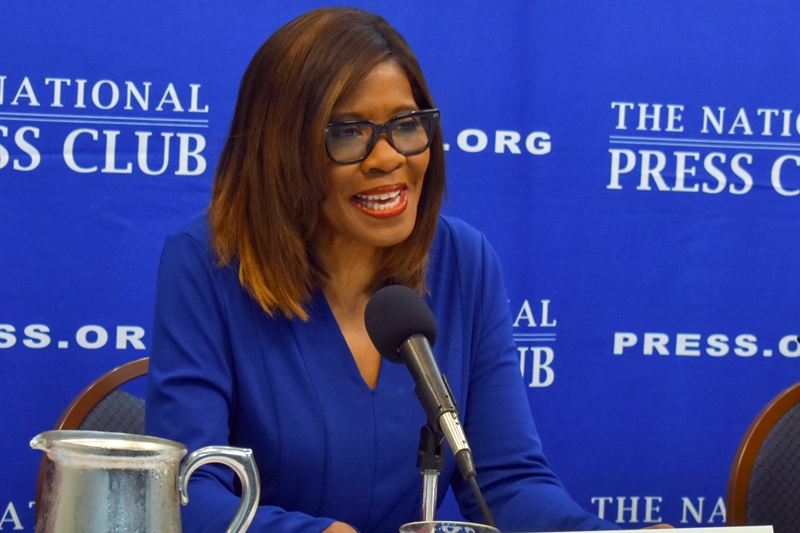Heads of physician organizations call for tougher regulation of e-cigarettes

Patrice Harris, president of American Medical Association, speaks at an Oct. 30 National Press Club Newsmaker on e-cigarettes. Photos: Alan Kotok
Three of the nation’s largest physician organizations -- all helmed by women doctors from Georgia -- urged the federal government, at a National Press Club Newsmaker event Wednesday, to tightly regulate e-cigarettes, which are used increasingly by both youth and adults to vape tobacco.
The impetus for their call is the limited science around electronic cigarettes, a highly unregulated environment, 34 recent deaths and more than 1,600 cases lung injury associated with e-cigarettes.
As a result, the presidents and presidents-elect of the American Medical Association (AMA), the American Academy of Pediatrics (AAP) and the American College of Physicians (ACP) urged action by the White House, the Food and Drug Administration (FDA) and the Congress to mitigate the health dangers of e-cigarettes.
Two of the doctors implicated the ubiquity, especially in schools, of JUUL and other vaping products for creating a “pediatric disease,” AMA President Patrice Harris went a step further, calling vaping “an urgent public health epidemic that must be addressed.”
Sally Goza, president-elect of AAP, said her pediatrician colleagues report patients sleeping with JUUL devices under their pillows and waking up to vape in the middle of the night. And Harris of the AMA said some wear them on necklaces or key fobs, almost as fashion accessories.
Jacqueline Fincher, ACP’s president-elect, along with Harris and Goza, called on the FDA to ban all flavored products, like mint and menthol, as the agency promised to do months ago. Goza added that the purchase age for all tobacco products should be raised to 21, stipulated in proposed congressional legislation.
Goza lamented that “the tobacco companies are working hard to keep all flavors on the market – or at a minimum, to keep mint and menthol on the shelves. The idea that mint and menthol are adult flavors is simply ridiculous. Children use mint toothpaste as toddlers,” she said.
Fincher of the ACP called for more research into the health effects of e-cigarettes and vaping, and recalled the troubling lack of information her patients have about the safety of vaping compared to smoking cigarettes.
“They may not realize that these products may expose them to harmful chemicals like diacytel, carcinogens, and heavy metals like nickel and lead, and increase their risk of serious lung injury, which can cause essentially a chemical burn on the inside of the lungs,” Fincher said.
Harris echoed the call for more medical research, adding that “there are known dangers to the developing brain…there are known impacts to the ability to learn, issues around impulse control.”
Vaping imposes a financial penalty, along with the cost to public health, the doctors said.
Fincher said, “In the state of Georgia alone, we know that tobacco products cost us over $3 billion per year in health care costs, over $500 million just in Medicaid costs alone. That is for just one year in one state. Can you imagine what those costs are for our nation as a whole?”
